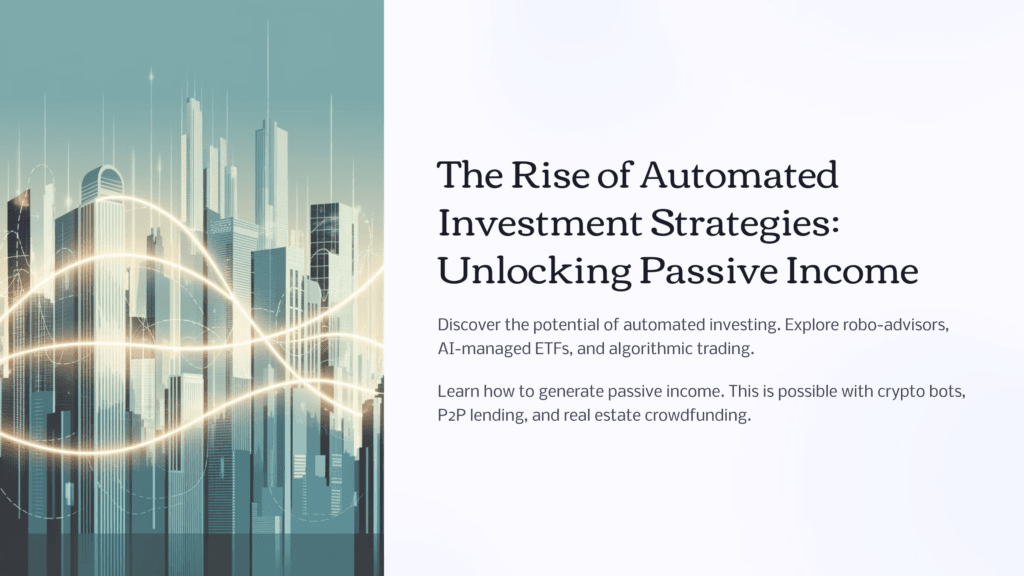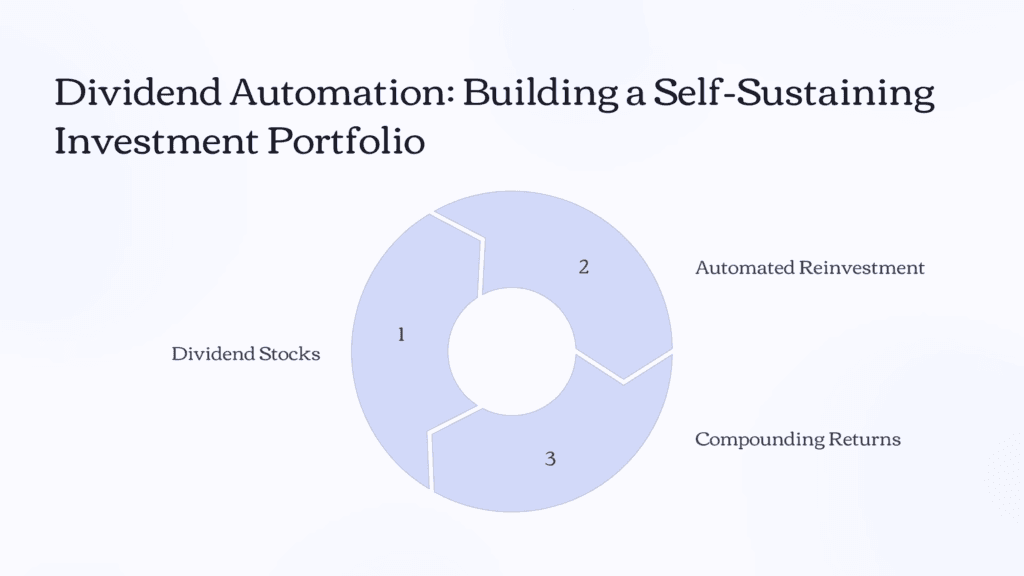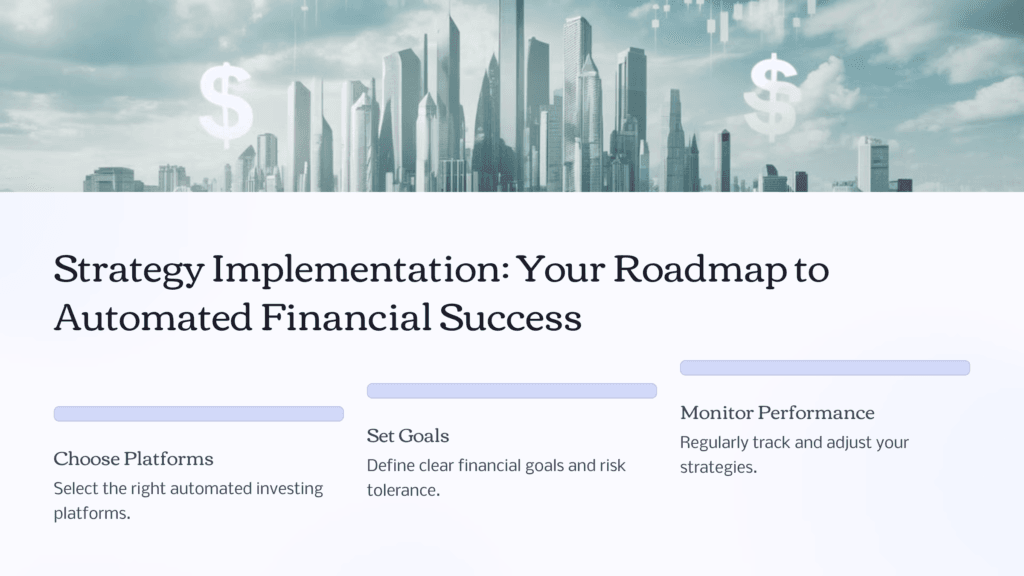
Investing has evolved significantly over the years, and today, automation has made it possible to generate income with minimal effort. Income from automated investment is an increasingly popular approach that allows investors to leverage AI-driven platforms, algorithmic trading, and robo-advisors to manage their portfolios efficiently. Whether you are a beginner or an experienced investor, automated investing provides an opportunity to earn passive income without actively monitoring the market.
In this guide, we will explore seven powerful strategies to help you earn income from automated investment. These methods range from AI-powered robo-advisors to crypto trading bots and real estate crowdfunding, offering various ways to optimize your investment portfolio. By the end of this article, you will have a solid understanding of how to incorporate automated investment strategies into your financial plan to maximize your returns.
Let’s dive deep into each strategy to discover how you can build a sustainable, automated income stream!
1. Passive Income from Robo-Advisors 🤖
What Are Robo-Advisors?

Robo-advisors are AI-driven investment platforms that automatically manage your portfolio based on your risk tolerance, investment goals, and market conditions. They eliminate the need for manual trading and financial advisors by using advanced algorithms to make informed investment decisions.
How Robo-Advisors Generate Income
Robo-advisors invest in diversified portfolios consisting of ETFs (Exchange-Traded Funds), stocks, and bonds. By continuously rebalancing your portfolio and optimizing asset allocation, they ensure long-term growth and stable income from automated investment.
Benefits of Using Robo-Advisors
- Low Fees: Robo-advisors typically charge lower fees than human financial advisors, making them cost-effective.
- Hands-Free Investing: No need to analyze the stock market daily—AI takes care of everything.
- Diversified Portfolio: Your investments are spread across various assets to reduce risk.
- Tax Optimization: Many robo-advisors use tax-loss harvesting to minimize your tax liability.
Best Robo-Advisors for Automated Investing
- Betterment (betterment.com) – Offers personalized investment plans with automated rebalancing.
- Wealthfront (wealthfront.com) – Uses AI to create tax-efficient portfolios.
- M1 Finance (m1finance.com) – Allows users to create custom investment portfolios with automation.
2. Algorithmic Trading for High-Frequency Investments 📈
What is Algorithmic Trading?

Algorithmic trading, or algo-trading, involves using pre-programmed software to execute trades at high speeds based on predefined criteria. This type of trading is widely used by hedge funds and institutional investors but is also available to retail investors.
How Algorithmic Trading Works
AI-driven algorithms analyze large amounts of financial data in real time and execute trades based on trends, patterns, and market conditions. This removes human emotions from trading and increases the chances of making profitable trades.
Advantages of Algorithmic Trading
- Faster Execution: Trades are executed instantly, allowing you to capitalize on market opportunities.
- No Emotional Trading: Decisions are based on data, not emotions.
- 24/7 Trading: Unlike human traders, automated trading bots operate continuously.
Best Algorithmic Trading Platforms
- QuantConnect (quantconnect.com) – Provides algorithmic trading strategies using Python.
- Trade Ideas (trade-ideas.com) – AI-powered trading signals for stock market investors.
- AlgoTrader (algotrader.com) – Institutional-grade algorithmic trading software.
3. Dividend Investing with Automated Reinvestment 💰
What is Dividend Investing?

Dividend investing is a strategy where investors buy stocks that pay regular dividends. These dividends can be reinvested automatically to purchase additional shares, leading to compounded wealth growth over time. Many investors use Dividend Reinvestment Plans (DRIPs) to automate this process.
How Dividend Reinvestment Works
With a DRIP, any cash dividends received from an investment are automatically reinvested into additional shares of the stock or ETF. This allows investors to continuously grow their holdings without needing to manually buy more shares.
Benefits of Automated Dividend Investing
- Compounding Growth: Reinvested dividends generate additional income, increasing overall wealth.
- Stable Income Source: Dividend-paying stocks provide consistent payouts.
- Long-Term Wealth Building: Over decades, dividend reinvestment significantly boosts investment returns.
Best Platforms for Automated Dividend Investing
- Schwab Dividend Reinvestment (schwab.com) – Offers commission-free DRIPs.
- Fidelity DRIP (fidelity.com) – Automatically reinvests dividends into fractional shares.
- Vanguard DRIP (investor.vanguard.com) – Provides tax-efficient dividend reinvestment options.
4. Peer-to-Peer Lending for Automated Returns 🤝
What is Peer-to-Peer Lending?

P2P lending platforms connect investors with borrowers, allowing individuals to fund loans and earn interest. These platforms automate the lending process, handling payments and risk assessments.
Benefits of P2P Lending
- Higher Returns: Interest rates are typically higher than traditional savings accounts.
- Automated Lending: Invest across multiple loans with minimal effort.
- Passive Income: Regular interest payments provide steady cash flow.
Best P2P Lending Platforms
- LendingClub (lendingclub.com)
- Prosper (prosper.com)
- Fundrise (fundrise.com)
5. Automated Crypto Trading Bots 🚀
What Are Crypto Trading Bots?

Crypto trading bots execute trades automatically based on market conditions, taking advantage of price fluctuations in the cryptocurrency market.
Advantages of Crypto Bots
- 24/7 Trading: The crypto market never sleeps, and bots ensure constant trading.
- AI Optimization: Bots use machine learning to adjust strategies.
- Emotional Discipline: Removes panic-driven decisions.
Best Crypto Trading Bots
- 3Commas (3commas.io)
- Pionex (pionex.com)
- Cryptohopper (cryptohopper.com)
6. Real Estate Crowdfunding for Passive Cash Flow 🏡
What is Real Estate Crowdfunding?

Real estate crowdfunding is an investment strategy where multiple investors pool their money together to fund real estate projects. Instead of purchasing properties directly, investors buy shares in real estate funds or crowdfunded property projects, allowing them to earn passive income from rental payments and property appreciation.
How Does Automated Real Estate Investing Work?
Many real estate crowdfunding platforms automate the entire investment process. Investors simply deposit their money, and the platform diversifies the funds across multiple properties. The platform then distributes rental income and appreciation gains directly to investors.
Benefits of Real Estate Crowdfunding
- Passive Income: Earn money without managing properties.
- Lower Entry Costs: Invest in real estate without needing large capital.
- Diversification: Spread risk across multiple properties.
- Automated Management: The platform handles tenant management, maintenance, and rent collection.
Risks of Real Estate Crowdfunding
- Illiquidity: Unlike stocks, real estate investments can take time to sell.
- Market Risks: Property values can fluctuate based on economic conditions.
- Regulatory Risks: Changes in real estate laws may impact investment returns.
Best Real Estate Crowdfunding Platforms
- Fundrise (fundrise.com) – Offers diversified real estate portfolios with automated investment features.
- Roofstock (roofstock.com) – Allows investors to buy rental properties with automated property management.
- RealtyMogul (realtymogul.com) – Specializes in commercial and residential real estate crowdfunding.
7. AI-Managed ETFs for Smart Investing 📊
What Are AI-Managed ETFs?

AI-managed ETFs (Exchange-Traded Funds) use artificial intelligence and machine learning algorithms to optimize portfolio management. These funds automatically adjust their holdings based on market trends, reducing the need for manual intervention by investors.
How AI-Managed ETFs Generate Income
AI-driven ETFs invest in a diversified basket of assets, including stocks, bonds, and commodities. They continuously analyze market conditions and rebalance portfolios to maximize returns while minimizing risks. Some AI-managed ETFs also use dividend reinvestment strategies to generate income from automated investment.
Advantages of AI-Managed ETFs
- Data-Driven Decision Making: AI analyzes massive datasets to optimize investment strategies.
- Lower Costs: AI-managed ETFs typically have lower fees than actively managed funds.
- Automatic Rebalancing: Portfolios adjust in real time based on market trends.
- Risk Management: AI algorithms identify and mitigate potential risks.
Risks of AI-Managed ETFs
- Market Volatility: While AI optimizes investments, it cannot eliminate market risks.
- Limited Human Oversight: Automated systems may not always predict market crashes.
- Technology Dependence: AI models rely on historical data, which may not always reflect future trends.
Best AI-Managed ETF Platforms
- BlackRock iShares (ishares.com) – Offers AI-powered ETFs for different market sectors.
- Vanguard ETFs (investor.vanguard.com) – Provides low-cost AI-managed ETFs with diversified portfolios.
- Schwab Intelligent Portfolios (schwab.com) – Uses AI to create automated, tax-efficient investment strategies.
Conclusion 🎯
Earning income from automated investment is now easier than ever, thanks to advancements in AI, machine learning, and automation. Whether you prefer robo-advisors, algorithmic trading, dividend reinvestments, P2P lending, crypto trading bots, real estate crowdfunding, or AI-managed ETFs, automation allows you to grow your wealth effortlessly.
By leveraging these strategies, you can achieve financial independence while reducing manual effort. Start exploring the best option that suits your investment goals today!
FAQs ❓
Q1: What is the safest automated investment strategy?
A: Robo-advisors and AI-managed ETFs are considered the safest due to their diversified portfolios and risk-adjusted strategies.
Q2: Can I lose money with automated investing?
A: Yes, all investments carry risk. However, diversification and proper strategy selection can minimize losses.
Q3: How much money do I need to start automated investing?
A: Some platforms allow you to start with as little as $5, while others require a minimum of $500 or more.
Q4: Are automated investments better than traditional investing?
A: They offer convenience and efficiency but may lack the personal touch of human advisors.
Q5: Can I use multiple automated investment platforms?
A: Absolutely! Diversifying across different platforms can help you manage risk and maximize returns.
Q6: Do automated investments require technical knowledge?
A: Not necessarily. Most platforms are designed to be user-friendly, making them accessible for beginners.
Q7: Are there any hidden fees with automated investing?
A: Some platforms charge management or transaction fees, so it’s best to review their fee structures before investing.
Q8: How do I choose the best automated investment strategy?
A: Consider factors like risk tolerance, investment goals, and time horizon before selecting a strategy.
